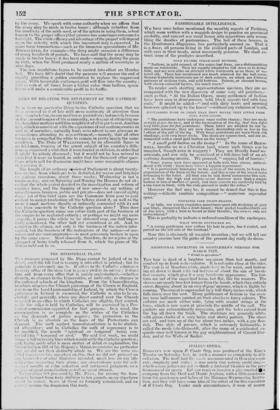EVILS OF DELAYING THE SE'l PLEMENT OF THE CATHOLIC QUESTION.
IT is from no particular liking to the Catholic question that we ie! ye recurred to it of late with more continuity of attention than iy seem to belong to our position as journalists; but merely because in 1 he present temper of the community, we despair of attracting no ce to lighter matters until this weightiest of all is put to rest. And this fact, which is consistent with the experience of our contemporaries as well as of ourselves, naturally leads us to advert to one grievous inconvenience attending its non-settlement,—namely, that all other business is compelled the while to remain in pretty nearly the same condition. The Duke of WELLINGroN, by an allowable figure in an Irishman, treaiing of the grand subject of his country's differences, expressed avisli that it were buried in oblivion, in order that it might be calmly discussed ; but it would not be less natural to wish that it were so buried, in order that the thousand other ques
ens wl tich call for discussion might have some reasonable chance el: receiving it.
The length of an ordinary session of Parliament is about twenty
vii ; from which are to be deducted, for recess and holydays v:I.rious occasions, about three weeks ; Wednesday is not a imsilless day, and on Saturday and Sunday the Houses do not sit ; I hat the whole period devoted to the investigation and reform of e-:s1 nee laws, and the framing of new ones—to say nothing of lieenis business, public and private—does not exceed eighty : :;,:et of this brief span are the Commons from year to year ent to assign (reckoning all the talking about it, as well as the :re formal motions directly or indirectly connected with it) not than one-sixth to the Catholic question alone Thus does -1 he Catholic question cause one entire sixth part of the business of Zile empire to be neglected entirely ; or perhaps we might say more Tie it causes the whole to be slovened over, one-half imperfeel ly eon sidered , The other half not considered at all. And, to corn! lete the climax, not only is the business of the nation inter upt ed, but the business of the instructors of the nation—of ourselves and our contemporaries—is most grievously broken in upon by the same cause. Most sincerely, therefore, do zve rejoice at the prospect of being 'dually released from it, which the plans of Ministers hold out to us.


















 Previous page
Previous page